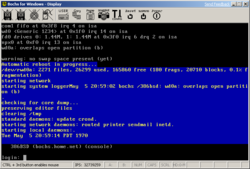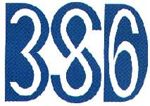Difference between revisions of "386BSD"
(→How do I get this to run?!) |
m (→See also: +BSD/OS) |
||
| (26 intermediate revisions by 4 users not shown) | |||
| Line 5: | Line 5: | ||
| name = 386 BSD | | name = 386 BSD | ||
| creator = CSRG, University of California, Berkeley | | creator = CSRG, University of California, Berkeley | ||
| − | | current version = 0 | + | | current version = 1.0 (1993) |
| − | | year introduced = | + | | year introduced = 1992 |
| type = Multitasking, multiuser | | type = Multitasking, multiuser | ||
| − | | architecture = [[i386]] theoretically portable | + | | architecture = [[i386]], theoretically portable |
}} | }} | ||
| − | + | '''386BSD''' (occasionally called '''Jolix''', a tribute to its creators Lynne Jolitz and William Jolitz) was the first time that the [[Net/2]] project was put into a functional release onto commodity hardware, and into the public under the BSD license. As the project eventually stalled, it became the starting point for both [[NetBSD]] & [[FreeBSD]], via the patchkits. While 386 BSD may be of historical significance, it's not up to the challenge of day to day usage, as it hasn't received any updates or patches in over 15 years. | |
| − | |||
| − | |||
== Releases == | == Releases == | ||
| − | There seems to have been | + | There seems to have been four releases of 386 BSD, starting with it being freely available on the Internet, then only available to those who purchased CD-ROMs. |
=== 0.0 === | === 0.0 === | ||
| − | + | This is the first version of 386 BSD that was released, on March 17, 1992. This version doesn't share its disk with MS-DOS or any other OS's, and uses a VAX style disktab/disklabel, making it difficult to install. | |
| − | |||
| − | |||
*[[386BSD 0.0]] | *[[386BSD 0.0]] | ||
=== 0.1 === | === 0.1 === | ||
| − | + | The 0.1 release was the most popular, as 0.0 proved to be very difficult to install, I'd think because it was more "VAX" like in how it treated the disks, and most people are not familiar with disklabels. There were 2 revisions to 0.1, with the patchkits, that eventually gave birth to both [[NetBSD]] and [[FreeBSD]]. Once patchkit 023 is installed, 386BSD will then run under [[Qemu]] 0.11.x | |
| + | |||
| + | *[[386 BSD 0.1]] | ||
| + | *[[386 BSD 0.1 pl23]] | ||
| + | *[[386 BSD 0.1 pl24]] | ||
| − | [ | + | *X11 I've found a massive lead [http://cd.textfiles.com/ldr199410/DISC2/X11/XFREE861/ here]. Thanks to shovelware CD makers! |
| − | + | === 0.2 === | |
| + | An update for ISO-9660 and Rock Ridge extensions. See DrDobbs July 1993. | ||
=== 1.0 === | === 1.0 === | ||
| − | + | [[386BSD 1.0]] was the CD-ROM / DrDobbs release | |
=== 2.0 === | === 2.0 === | ||
| − | In an email with Lynne Jolitz, she has confirmed that there was a 2.0 release. | + | In an email with Lynne Jolitz, she has confirmed that there was a 2.0 release. In 2016 it was re-released on [https://github.com/386bsd/386bsd github] |
== Where can I get a copy == | == Where can I get a copy == | ||
| Line 50: | Line 51: | ||
The quickest way is to use [https://sourceforge.net/projects/bsd42/files/4BSD%20under%20Windows/v0.4/386BSD-0.1.exe/download 386BSD-0.1exe] which is a ready to run package for Windows users that includes a preconfigured Qemu & disk image. | The quickest way is to use [https://sourceforge.net/projects/bsd42/files/4BSD%20under%20Windows/v0.4/386BSD-0.1.exe/download 386BSD-0.1exe] which is a ready to run package for Windows users that includes a preconfigured Qemu & disk image. | ||
| − | + | ==Description== | |
| + | |||
| + | The system (releases 0.0 and 0.1) was described in a series of 17 articles in [[Dr. Dobb's Journal]], from January 1991, to July 1992: | ||
| − | 386 | + | * [https://www.drdobbs.com/open-source/porting-unix-to-the-386-a-practical-appr/184408470 Designing the Software Specification] |
| + | * [https://www.drdobbs.com/open-source/porting-unix-to-the-386-three-initial-pc/184408496 Three Initial PC Utilities] | ||
| + | * [https://www.drdobbs.com/cpp/porting-unix-to-the-386-the-standalone-s/184408513 The Standalone System] | ||
| + | * [https://www.drdobbs.com/open-source/porting-unix-to-the-386-language-tools-c/184408529 Language Tools Cross Support] | ||
| + | * [https://www.drdobbs.com/porting-unix-to-the-386-the-initial-root/184408547 The Initial Root Filesystem] | ||
| + | * [https://www.drdobbs.com/porting-unix-to-the-386-research-the-co/184408566 Research & The Commercial Sector] | ||
| + | * [https://www.drdobbs.com/parallel/porting-unix-to-the-386-a-stripped-down/184408583 A Stripped-Down Kernel] | ||
| + | * [https://www.drdobbs.com/open-source/porting-unix-to-the-386-the-basic-kernel/184408600 The Basic Kernel] | ||
| + | * [https://www.drdobbs.com/porting-unix-to-the-386-the-basic-kernel/184408617 Multiprogramming and Multitasking I] | ||
| + | * [https://www.drdobbs.com/porting-unix-to-the-386-the-basic-kernel/184408637 Multiprogramming and Multitasking II] | ||
| + | * [https://www.drdobbs.com/open-source/porting-unix-to-the-386-the-basic-kernel/184408655 Device Autoconfiguration] | ||
| + | * [https://www.drdobbs.com/architecture-and-design/porting-unix-to-the-386-device-drivers/184408710 Unix Device Drivers I] | ||
| + | * [https://www.drdobbs.com/embedded-systems/porting-unix-to-the-386-device-drivers/184408727 Unix Device Drivers II] | ||
| + | * [https://www.drdobbs.com/architecture-and-design/porting-unix-to-the-386-device-drivers/184408747 Unix Device Drivers III] | ||
| + | * [https://www.drdobbs.com/architecture-and-design/porting-unix-to-the-386-missing-pieces-p/184408764 Missing Pieces I] | ||
| + | * [https://www.drdobbs.com/architecture-and-design/porting-unix-to-the-386-missing-pieces-i/184408782 Missing Pieces II] | ||
| + | * [https://www.drdobbs.com/porting-unix-to-the-386-the-final-step/184408800 The Final Step] | ||
| − | + | They're not totally open access; you have to register with DDJ to get all of them. However, there is this: | |
| − | |||
| − | |||
| − | + | * [https://www.386bsd.org/releases 386BSD] | |
| − | + | which appear to be the same as the above. | |
| − | == | + | ==See also== |
| − | + | * [[BSD/386]] | |
| + | * [[BSD/OS]] | ||
| + | * [[Installing 386BSD 1.0 on Qemu]] | ||
| − | + | ==External links== | |
| − | + | ||
| − | + | * [https://www.oreilly.com/openbook/opensources/book/kirkmck.html Twenty Years of Berkeley Unix: From AT&T-Owned to Freely Redistributable] - includes a crisp, clear description of the background to 386BSD | |
| − | |||
| − | *[ | ||
| − | |||
| − | |||
| − | |||
| − | |||
| − | |||
{{Nav Unix}} | {{Nav Unix}} | ||
| + | |||
| + | [[Category: Unix-based OS's]] | ||
Latest revision as of 20:42, 31 August 2024
| 386 BSD | |
 Logging into a 386 BSD system | |
| Type: | Multitasking, multiuser |
|---|---|
| Creator: | CSRG, University of California, Berkeley |
| Architecture: | i386, theoretically portable |
| This Version: | 1.0 (1993) |
| Date Released: | 1992 |
386BSD (occasionally called Jolix, a tribute to its creators Lynne Jolitz and William Jolitz) was the first time that the Net/2 project was put into a functional release onto commodity hardware, and into the public under the BSD license. As the project eventually stalled, it became the starting point for both NetBSD & FreeBSD, via the patchkits. While 386 BSD may be of historical significance, it's not up to the challenge of day to day usage, as it hasn't received any updates or patches in over 15 years.
Contents
Releases
There seems to have been four releases of 386 BSD, starting with it being freely available on the Internet, then only available to those who purchased CD-ROMs.
0.0
This is the first version of 386 BSD that was released, on March 17, 1992. This version doesn't share its disk with MS-DOS or any other OS's, and uses a VAX style disktab/disklabel, making it difficult to install.
0.1
The 0.1 release was the most popular, as 0.0 proved to be very difficult to install, I'd think because it was more "VAX" like in how it treated the disks, and most people are not familiar with disklabels. There were 2 revisions to 0.1, with the patchkits, that eventually gave birth to both NetBSD and FreeBSD. Once patchkit 023 is installed, 386BSD will then run under Qemu 0.11.x
- X11 I've found a massive lead here. Thanks to shovelware CD makers!
0.2
An update for ISO-9660 and Rock Ridge extensions. See DrDobbs July 1993.
1.0
386BSD 1.0 was the CD-ROM / DrDobbs release
2.0
In an email with Lynne Jolitz, she has confirmed that there was a 2.0 release. In 2016 it was re-released on github
Where can I get a copy
At the moment the only known places to get copies are:
- oldlinux.org 0.0, 0.1 and the two patchkits.
- tuhs.org 0.0, 0.1 and the two patchkits.
- freebsd.org ISO with 0.0, 0.1, the patchkits in various states, a large number of other contributions to 0.0 and 0.1 and a USENET archive of comp.unix.bsd.
How do I get this to run?!
Right now the only version fully running in emulation is 0.1 The quickest way is to use 386BSD-0.1exe which is a ready to run package for Windows users that includes a preconfigured Qemu & disk image.
Description
The system (releases 0.0 and 0.1) was described in a series of 17 articles in Dr. Dobb's Journal, from January 1991, to July 1992:
- Designing the Software Specification
- Three Initial PC Utilities
- The Standalone System
- Language Tools Cross Support
- The Initial Root Filesystem
- Research & The Commercial Sector
- A Stripped-Down Kernel
- The Basic Kernel
- Multiprogramming and Multitasking I
- Multiprogramming and Multitasking II
- Device Autoconfiguration
- Unix Device Drivers I
- Unix Device Drivers II
- Unix Device Drivers III
- Missing Pieces I
- Missing Pieces II
- The Final Step
They're not totally open access; you have to register with DDJ to get all of them. However, there is this:
which appear to be the same as the above.
See also
External links
- Twenty Years of Berkeley Unix: From AT&T-Owned to Freely Redistributable - includes a crisp, clear description of the background to 386BSD
| v • d • e UNIX Versions, Vendors and Related |
|---|
| Research Unix PDP-7 UNIX • V1 • V2 • V3 • V4 • V5 • V6 • V7 • V8 • V9 • V10 • LSX • MINI-UNIX • Unix/32V
AT&T - CB-UNIX • PWB/UNIX • USG UNIX • System III • System IV • System V BSD - 2.9 BSD • 2.10 BSD • 2.11 BSD • 3BSD • 4BSD • 4.1 BSD • 4.2 BSD • 4.3 BSD • 4.4 BSD BSD Descendants 386BSD • NetBSD • FreeBSD • OpenBSD • NeXTSTEP • Darwin |
| Other - xv6 • AMIX • SunOS • Solaris • ULTRIX • A/UX • XENIX • AIX • Dell UNIX |
